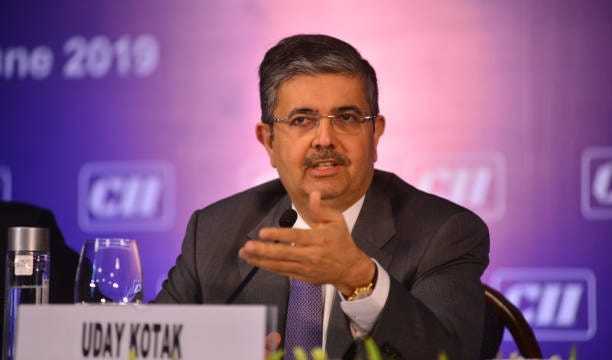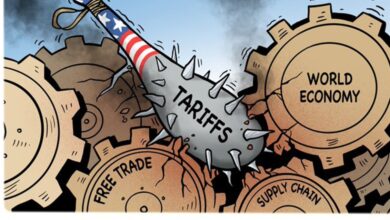Mark Kingdon, The Man Who Orchestrated Adani Trades And Under The Spotlight, Has A Chinese Link Too. Here Is What We Know

Who Is Mark Kingdon?
The Adani saga would have been brushed under the carpet if not for SEBI issuing a show-cause notice to Hindenburg and the latter’s detailed response, a counterattack on SEBI accusing the former of neglecting its responsibility as India’s market regulator and colluding to protect the interests of ‘the special’ ones.
However, even as Kotak’s role became more prominent, it also brought another entity into the limelight—US-based hedge fund Kingdon Capital Management LLC and its founder, Mark Elliot Kingdon.
So, who is Mark Kingdom, and what role did the US-based hedge fund play in this entire Adani fiasco?
According to recent US SEC filings, the fund Kingdon Capital Management LLC, founded by Kingdon, who is also the managing member of the firm, has over five decades of solid presence in the world of investments, with an asset under management of USD 623.21 million as of January 2023.
 Mark Kingdon, The Man Of The Hour
Mark Kingdon, The Man Of The Hour
From the details available, Kingdon Capital was founded in April 1983. However, Mark Kingdon had exposure and experience in the world of investments, having worked for almost eight years in an investment firm, Century Capital Associates, where he was a portfolio manager and general partner.
Before that, he was a Pension Fund Administrator for American Telephone & Telegraph Co.. He had his first tryst with the stock market during his first summer job “as an office boy at a Midtown Manhattan brokerage during the 1965 bull market”.
In terms of his education, he has an MBA from Harvard Business School, a batch of 1973 and received a BA in Economics from Columbia College in 1971.
From what we comprehend, it seems to be a resume and work experience/exposure like most hedge funders, so what brought his firm and him under the lens of SEBI?
One detail that needs to be brought up here is that Kingdon is married to Chinese-American hedge fund manager Anla Cheng, who made her fortune by investing in China. The Kingdon couple was involved in various philanthropic initiatives in New York and around the world through their arm, Mark and Anla Cheng Kingdon Foundation.
The Secret Handshake
What has caught SEBI’s attention is an agreement between Mark Kingdon and Hindenburg Research to share a report exclusively before its wider publication and to establish positions on Adani stock.
For SEBI, this arrangement constituted a well-executed scheme.
According to SEBI’s show-cause notice, Hindenburg had a pre-publication understanding and profit-sharing arrangement with Kingdon Capital. Hindenburg verbally agreed to reduce its share from 30% to 25% because the trade required setting up expensive offshore structures for execution.
However, Kingdon, on its part, informed SEBI that it had received legal advice stating that it could enter into a research services agreement with a third-party firm that publicly releases short reports on companies.
Therefore, this agreement would allow Kingdon Capital to receive a draft copy of the report before its public release and to make investments accordingly.
 SEBI Finds The Chinese Connection And Kotak Connection
SEBI Finds The Chinese Connection And Kotak Connection
SEBI, in its investigation to get to the bottom of the pit, uncovered various channels and structures used by Kingdon. Surprisingly, the ownership and control trail of Kingdon entities appeared rather upfront and ended with the Kingdon family itself.
The Kotak connection comes in as the Kingdon Offshore Master Fund, invested in Kotak Structured FPI KIOF Class F, had three feeder funds: Kingdon Associates (66%), Kingdon Offshore Ltd (28%), and Kingdon Family Partnership (6%).
Hence, through these channels, Kingdon himself had an exposure of 54.09%, and his family held 4.71%, bringing their combined holding of KIOF to 58.8%. Additionally, as the investment manager, he had 100% control over the investment strategies and execution.
Now comes the Chinese connection—Kingdon and his wife Anla Cheng’s foundation had over 25% exposure in Kingdon Offshore, as per SEBI’s investigation.
The Foundation Under Lens
The foundation has greatly focused on the Chinese diaspora in the US as well as undertaken significant initiatives in Mainland China; it does so by supporting several causes, including education, social welfare and cultural initiatives.
According to a profile on the Global Chinese Philanthropy Initiative portal,
“Ms. Cheng and her husband, Mark Kingdon, successful hedge fund investors, now direct the Mark and Anla Cheng Kingdon Foundation, based in New York City. Since 1998, the foundation has focused on higher education, arts and culture, and social services. Ms. Cheng and Mr. Kingdon have made substantial contributions to Columbia University, of which Mr. Kingdon was Vice Chair/Trustee, and China Institute, of which Ms. Cheng is Vice Chair/Trustee.”
Cheng also funds efforts such as the Museum of Chinese in America (MOCA). According to the Global Chinese Philanthropy Initiative portal,
“Ms. Cheng continues to pursue projects to advance the understanding of Chinese in America and supports curriculum, textbook, and educational projects that increase understanding among students domestically as well as abroad.”
A Chinese-American who amassed her fortune by investing in China, Cheng was a founding member of the Public Broadcasting System series “Becoming American: The Chinese Experience.” This series explores how Chinese immigrants have balanced their heritage with their new country, making trade-offs to form new identities.
 She is also the founder and CEO of Serica Initiative, as per her Linkedin profile.
She is also the founder and CEO of Serica Initiative, as per her Linkedin profile.
Serica was formerly the sister non-profit of The China Project, a New York-based, China-focused news, information, and business services platform.
According to The China Project website, Cheng was the founder and CEO of The China Project (formerly known as SupChina) from 2015 to 2022.
As per SEBI’s findings, Hindenburg first shared the draft Adani report with Kingdon entities in November 2022.
The China Project And Chinese Govt
Ironically, in October 2022, a month before the Hindenburg-Adani report, Cheng and The China Project faced controversy when a former employee turned whistleblower alleged that the firm was acting on behalf of the Chinese Communist Party and was sympathetic to its causes.
However, Cheng and The China Project have vehemently denied these charges.
Still, news reports suggested that a complaint had been filed with the US Department of Justice and the SEC, which some Republican senators were aggressively pursuing.
It must be noted here that SEBI has not named Chen and her foundation as one of the noticees in the show-cause notice, nor has it mentioned any Chinese connection.
So now that we have an understanding of the Kingdon connection, what can SEBI actually do?
Some lawyers believe that SEBI’s notice might not hold up under judicial scrutiny, even if an adverse order is issued.
“Taking action against a US-based entity like Hindenburg falls into a grey area due to jurisdictional limitations. SEBI can, however, collaborate with international regulatory bodies such as the US Securities and Exchange Commission (SEC) under mutual cooperation agreements within IOSCO to address any cross-border securities law violations,” said Sumit Agrawal, founder of Regstreet Law Advisors and a former SEBI officer.
According to Agrawal, potential SEBI actions like bans or fines as preventive measures against further criticism of Indian companies would raise more questions for SEBI than resolve the issue.
“Proposing a ban on Hindenburg from participating in Indian markets would depend on a finding of guilt for employing a ‘scheme’ or ‘artifice’ under SEBI FUTP Regulations or disseminating false information under FPI or Research Analyst Regulations. In appeals, courts may need to examine the history and future implications of the case to determine if it is intrinsically linked to the business, political environment, and regulators, which Hindenburg might argue constitutes a ‘scheme’ or ‘artifice’ for malicious prosecution against them,” Agrawal concluded.
Also to be noted is that Hindenburg included the following disclaimer in its original report published in January 2023:
“Hindenburg Research (possibly along with or through our members, partners, affiliates, employees, and/or consultants) along with our clients and/or investors has a short position in all stocks or bonds (and/or derivatives of the stock) covered herein, and therefore stands to realize significant gains in the event that the price of any security covered herein declines. Following the publication of any report or letter, we intend to continue transacting in the securities covered herein, and we may be long, short, or neutral at any time hereafter regardless of our initial conclusions or opinions.”
SEBI, however, focused on the part of the disclaimer where the research firm stated its report was related to securities traded outside India.
“We hold short positions in Adani Group Companies through US-traded bonds and non-Indian-traded derivatives, along with other non-Indian-traded reference securities. This report relates solely to the valuation of securities traded outside of India.”
The Adani Statement
Earlier this year, Gautam Adani himself hinted at political motives behind the short sale.
“Last year on January 24, we were subject to a massive attack by a US short seller. The objective was not just to destabilize us but also to politically defame India’s governance practices,” he said at a private event in March.
The Bottom Line: Now that a somewhat clearer picture is emerging in this entire-Hindenburg-Adni-SEBI-Kingdon-Kotak equation, what should one gather?
Was this a conspiracy to destabilise the country, markets, and economy as the Chinese government’s connection through The China Project has been revealed?
If yes, where does that leave Kotak and should SEBI not investigate this further?





